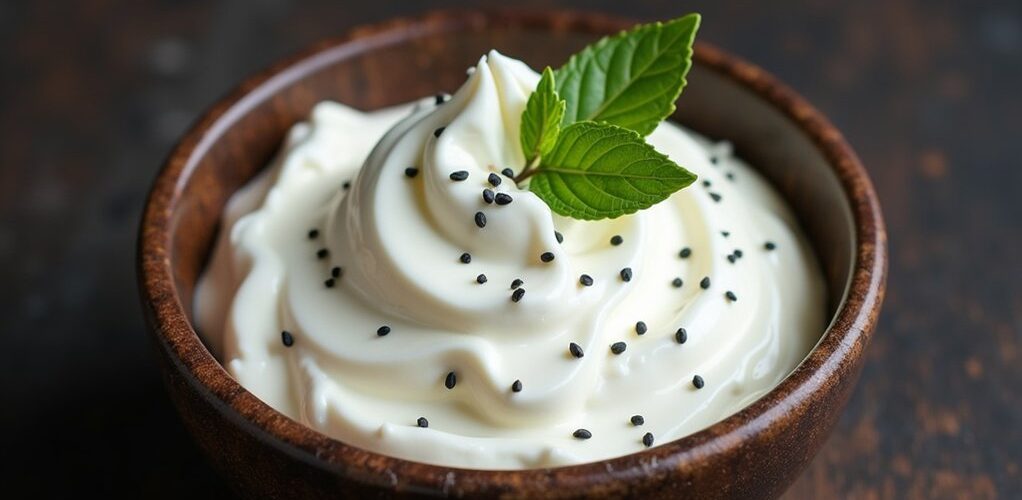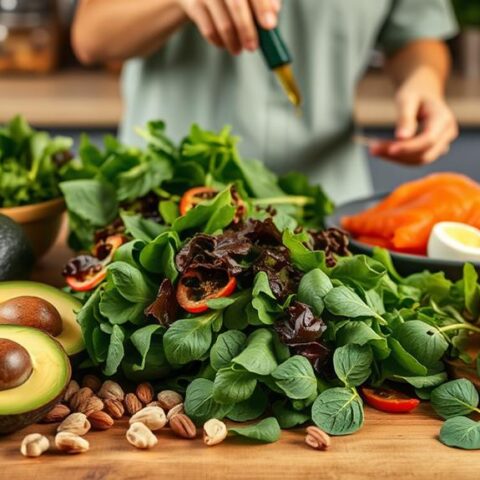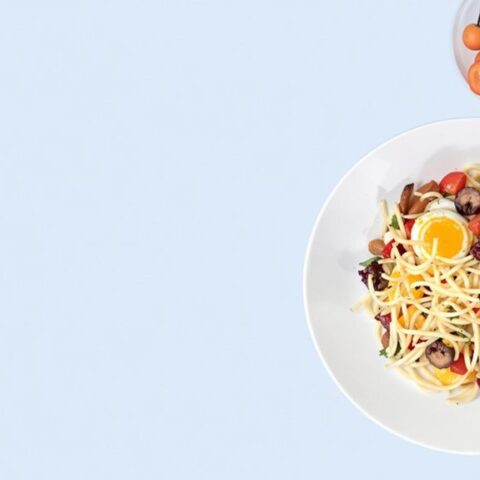
Sour cream fits well into a low-carb diet, containing just 5.56g of net carbs per 100g serving and 1.3g per standard 2-tablespoon portion. Full-fat varieties offer fewer carbs than reduced-fat alternatives, which often contain added sugars and thickeners. Regular sour cream provides essential nutrients like calcium, phosphorus, and vitamin A, along with beneficial bacteria for gut health. Proper portion control and brand selection reveal how this versatile dairy product can enhance a low-carb lifestyle.
Key Takeaways
- Regular sour cream is low-carb friendly, containing only 5.56g net carbs per 100g serving or 1.3g per 2-tablespoon portion.
- Full-fat sour cream has fewer carbs than low-fat versions, which contain added thickeners and sugars.
- A moderate 50g daily serving of sour cream contributes just 2.78g net carbs, making it suitable for keto diets.
- Choose brands with minimal ingredients and no added sugars for the lowest carb content, like Daisy and Kemps.
- Sour cream provides essential nutrients and healthy fats while keeping carbs low enough for ketogenic meal planning.
Understanding Sour Cream's Carbohydrate Content
While many dairy products can be high in carbohydrates, sour cream stands out as a relatively low-carb option that fits well within various dietary restrictions.
Regular sour cream contains approximately 5.56g of net carbs per 100g serving, making it a sour cream keto-friendly choice for those monitoring their carb content. A standard 2-tablespoon serving provides just 1.3 grams of carbohydrates, which easily accommodates most low carb count requirements.
However, it's essential to note that nonfat varieties typically contain higher amounts of carbohydrates due to additional ingredients. When managing daily carb intake, consumers should be mindful of portion sizes, as a 50g serving contributes about 2.78g of net carbs to their daily total, though this remains manageable within most low-carb dietary frameworks.
For those following a keto diet, prioritization of high-quality fats such as those found in avocados and olive oil, can help improve cholesterol levels while maintaining a low-carb intake.
The Basic Nutritional Profile of Sour Cream
Regular sour cream presents a balanced nutritional profile that aligns well with low-carb dietary preferences. With only 5.56 grams of net carbs per 100-gram serving, sour cream fits comfortably into most low carb eating plans. Its substantial fat content of 5.8 grams per two-tablespoon serving makes it particularly keto-friendly while contributing to its rich, creamy texture. Beyond its favorable macronutrient ratio, sour cream delivers essential nutrients including calcium, phosphorus, and vitamin A. Additionally, incorporating full-fat cheese alongside sour cream can offer a variety of flavors and maintain low-carb intake. For those following strict low carb diets, it's important to note that full-fat versions are preferable to reduced-fat alternatives, which typically contain higher carbohydrate levels. A standard two-tablespoon serving contains just 1.3 grams of carbohydrates, making it an excellent choice for maintaining ketosis while adding flavor to meals.
Regular vs. Low-Fat Sour Cream: Carb Comparison
Understanding the carbohydrate differences between regular and low-fat sour cream can considerably impact dietary choices, particularly for those following carb-restricted eating plans.
A carb comparison reveals that regular sour cream contains approximately 5 grams of carbohydrates per 100 grams, while low-fat sour cream typically contains 6 to 8 grams due to added thickeners and sugars.
In a standard 2-tablespoon serving, regular sour cream provides about 1.3 grams of carbs, compared to 2 grams or more in its low-fat counterpart.
Regular sour cream proves more keto-friendly due to its higher fat content and lower carbohydrate intake profile, making it the preferred choice for maintaining ketosis.
Those following strict low-carb diets should opt for regular sour cream to avoid the hidden carbs often present in low-fat varieties.
To ensure that your sour cream choice aligns with your keto diet goals, it's essential to familiarize yourself with food labels to identify any hidden carbs that might disrupt ketosis.
How Sour Cream Fits Into a Low-Carb Diet
Successfully integrating sour cream into a low-carb diet requires strategic portion control and careful consideration of serving sizes. With approximately 5.56g of net carbs per 100g serving, sour cream can be incorporated into low-carb meal plans when consumed mindfully. A standard two-tablespoon serving contains just 1.3g of carbohydrates, making it suitable for those following a low-carb diet or sour cream keto approach. For ideal results on a low-carb diet, choosing full-fat, high fat sour cream varieties is recommended over low-fat alternatives, which may contain added sugars. While sour cream can enhance the flavor of various dishes, monitoring portion size remains essential to avoid exceeding daily carbohydrate limits. This versatile ingredient allows for creative meal planning while maintaining dietary goals through careful measurement and conscious consumption. Recognizing serving sizes ensures accurate nutrient tracking, as many packaged foods contain multiple servings.
Health Benefits of Including Sour Cream in Your Diet
While sour cream is often celebrated for its rich, creamy texture and versatile culinary applications, its nutritional profile offers considerable health benefits that extend far beyond taste enhancement.
This dairy product delivers essential vitamins and minerals, including calcium, phosphorus, and potassium, which support bone health and crucial bodily functions. The healthy fats in sour cream contribute to increased satiety and improved absorption of fat-soluble vitamins, making it a valuable addition to a low carb lifestyle.
Additionally, sour cream contains beneficial bacteria that promote gut health and boost immune function, while its nutrient density adds valuable nutritional content to meals without greatly impacting carbohydrate intake.
These properties make sour cream a smart choice for those seeking both flavor and health benefits in their dietary choices.
Potential Drawbacks and Considerations
Despite sour cream's numerous health benefits, several important considerations warrant attention when incorporating it into a low-carb diet. Regular sour cream contains significant amounts of saturated fat, which may impact cardiovascular health by raising LDL cholesterol levels when consumed in excess. For individuals with lactose intolerance, sour cream can trigger uncomfortable digestive symptoms and should be avoided or replaced with dairy-free alternatives. While sour cream can fit into a low-carb lifestyle, its carbohydrate content of 5.56g per 100g serving may quickly accumulate, particularly when using larger portions. Additionally, excessive consumption can lead to unintended weight gain due to its caloric density, even within a low-carb framework. Those following strict ketogenic diets should carefully monitor their portion sizes to maintain their desired macronutrient ratios. Furthermore, long-term adherence to high-fat diets like keto may be associated with an increased risk of heart disease, necessitating careful consideration when incorporating high-fat foods like sour cream.
Best Ways to Use Sour Cream on a Low-Carb Diet
Sour cream serves as a versatile ingredient for creating flavorful low-carb dips, offering endless possibilities when combined with herbs, spices, and other keto-friendly ingredients. Beyond its role as a dip base, sour cream enriches various low-carb recipes, from pancakes to baked goods, adding moisture and richness while maintaining minimal carbohydrate content. Its creamy texture and tangy flavor make it an excellent addition to numerous keto-friendly dishes, whether as a condiment for tacos, a component in creamy avocado sauces, or an ingredient in low-carb baking projects. Keto Ranch Dressing combines sour cream and mayo, offering a low-carb option with only 2 grams of carbs per serving, making it an excellent choice for salads or dips.
Delicious Keto Dip Ideas
For those following a ketogenic lifestyle, creating flavorful dips with sour cream opens up a world of delicious snacking possibilities while maintaining low-carb requirements.
Sour cream serves as an excellent base for keto-friendly dips, allowing for creative combinations with herbs, spices, and other low-carb ingredients.
Popular options include mixing sour cream with fresh herbs for a homemade ranch dip, combining it with mashed avocado for a creamy guacamole-style spread, or creating a revitalizing tzatziki sauce with cucumber and garlic.
When preparing these creamy dips, it's important to monitor portion sizes, as sour cream contains approximately 5.56g of net carbs per 100g serving.
These versatile dips pair perfectly with low-carb vegetables, making them ideal for parties or everyday snacking while adhering to ketogenic dietary guidelines.
Low-Carb Recipe Additions
While maintaining a low-carb lifestyle requires careful attention to ingredients, incorporating sour cream into recipes opens up numerous possibilities for delicious meal enhancements.
This keto-friendly dairy product can transform ordinary dishes with its creamy texture and minimal carb impact, containing only 5.56g of net carbs per 100g serving.
Recipes that incorporate sour cream range from savory to baked goods. It serves as an excellent base for low-carb dips, including guacamole and ranch dressing, while adding moisture to biscuits and muffins.
As a topping for meats, vegetables, or eggs, sour cream contributes beneficial fats while enhancing flavor profiles. Creative applications include incorporating it into invigorating dishes like cucumber dill salad or traditional tzatziki sauce, making it a versatile ingredient for those following a carb-conscious eating plan.
Recommended Serving Sizes and Portions
Maintaining appropriate portion sizes of sour cream is essential for those following a low-carb diet, with the standard serving size being 2 tablespoons or 30 grams, containing just 1.3 grams of carbohydrates.
Regular monitoring of sour cream consumption becomes particularly important since larger portions, such as 100 grams, can quickly accumulate to 5.56 grams of net carbs, potentially disrupting ketosis for strict adherents.
For best results, measuring tools like tablespoons or kitchen scales can help track portions accurately, ensuring daily carbohydrate limits remain within acceptable ranges.
Daily Portion Guidelines
The standard serving size for sour cream sits at 2 tablespoons (30 grams), containing a modest 1.3 grams of carbohydrates per portion.
For those following a low carb keto lifestyle, careful portion control becomes essential to maintain ideal carb intake throughout the day.
- Limit daily sour cream consumption to 50 grams to stay within 2.78 grams of net carbs
- Monitor portions carefully, as 100 grams contains 5.56 grams of net carbs
- Use sour cream as a condiment rather than a primary ingredient
- Measure servings precisely to avoid exceeding daily carb limits
- Consider alternative low-carb toppings when sour cream is high in your daily count
While sour cream can fit into a ketogenic diet, tracking serving sizes guarantees it remains a complementary addition rather than a significant source of carbohydrates.
Measuring Sour Cream Right
Precise measurement of sour cream servings plays an essential role in maintaining ketogenic dietary goals and managing daily carb intake effectively. Using a kitchen scale guarantees accurate portion control when measuring sour cream, helping keto dieters track their net carbs with confidence. While a standard serving size of 2 tablespoons fits well within most low-carb plans, larger portions can quickly accumulate unwanted carbohydrates.
| Serving Size | Net Carbs | Portion Control | Keto-Friendly | Daily % (20g limit) |
|---|---|---|---|---|
| 2 tbsp | 1.3g | Ideal | Yes | 6.5% |
| 50g | 2.78g | Moderate | Yes | 13.9% |
| 100g | 5.56g | Large | Limited | 27.8% |
| 150g | 8.34g | Excessive | No | 41.7% |
| 200g | 11.12g | Not Recommended | No | 55.6% |
Shopping Guide: Choosing Low-Carb Sour Cream Brands
Smart shopping for low-carb sour cream requires careful attention to nutrition labels and ingredient lists, as not all brands are equally suitable for a low-carb lifestyle.
Selecting the right sour cream demands careful label reading, since carb content varies significantly between different brands and varieties.
When examining full-fat options at the grocery store, consumers should focus on products that contain minimal ingredients and no added sugars.
- Look for trusted brands like Daisy and Kemps that offer approximately 1 net carb per serving
- Check the ingredient list for cream and lactic acid cultures only
- Avoid reduced-fat varieties which often contain more carbohydrates
- Select full-fat versions with 1-2 grams of carbs per 2-tablespoon serving
- Skip products with thickeners, stabilizers, or added sweeteners
These guidelines guarantee that shoppers can confidently select sour cream products that align with their low-carb dietary goals while maintaining the creamy texture and taste they desire.
Reading Sour Cream Labels: What to Look For
When examining sour cream labels, consumers should first focus on the fat content, as full-fat varieties typically contain fewer carbs than their reduced-fat counterparts, making them more keto-friendly. The ingredient list should ideally show only cream and lactic acid cultures, without added sugars or thickeners that can increase carb content. A standard two-tablespoon serving of quality sour cream contains approximately 1-2 grams of net carbs. Shoppers should carefully compare nutritional facts across brands, paying particular attention to serving sizes, total fat content, and net carbs to select products that align with their low-carb dietary requirements. It's important to consider options like keto-friendly brands which offer low-carb, high-fat dairy products that can fit well within a keto diet plan.
Low-Carb Recipe Ideas Using Sour Cream
Sour cream's versatility makes it an excellent ingredient for creating keto-friendly dips and sauces, from herb-infused party dips to creamy avocado toppings for salads and proteins. Home cooks can incorporate sour cream into quick low-carb main dishes, such as protein-rich tuna egg salad or creamy chicken casseroles that satisfy without compromising ketogenic goals. For those seeking simple side dishes, sour cream transforms ordinary vegetables into satisfying accompaniments through creative combinations with herbs, spices, and other low-carb ingredients. Additionally, sour cream can be used to enhance low-carb cauliflower rice, offering a creamy texture and added richness to this nutritious and low-calorie alternative.
Keto-Friendly Dips and Sauces
Looking for delicious low-carb alternatives to traditional dips and sauces, health-conscious individuals can turn to sour cream as a versatile base ingredient.
This creamy dairy product serves as an excellent foundation for creating keto-friendly condiments that enhance meals while maintaining low carbohydrate content.
- Creamy avocado sauce blends perfectly with sour cream for a rich, low-carb dip
- Mediterranean-inspired tzatziki combines cucumber, garlic, and dill for a revitalizing option
- Classic ranch and onion dips made with herbs and spices complement vegetables
- Cucumber dill salad dressing adds tang to summer dishes
- Tuna egg salad gains richness and moisture from sour cream-based sauces
These versatile dips and sauces demonstrate how sour cream can transform ordinary low-carb meals into flavorful dining experiences while adhering to ketogenic dietary guidelines.
Quick Low-Carb Main Dishes
When preparing quick and satisfying low-carb main dishes, home cooks can harness the versatility of sour cream to create flavorful, keto-friendly meals that come together effortlessly.
Popular recipes include creamy chicken casserole, which combines tender chicken with sour cream and cheese for a satisfying dish that maintains ketogenic requirements.
For those seeking variety, sour cream can transform into a rich garlic mushroom sauce for meats, adding depth without excessive carbs.
Low-carb taco bowls benefit from a dollop of sour cream, enhancing both texture and taste while keeping carb counts in check.
Home chefs can also create simple yet delicious meals by mixing sour cream with herbs and spices to accompany roasted vegetables or grilled proteins, making it an essential ingredient for quick, creamy, and keto-compliant dishes.
Easy Side Dish Ideas
Several delightful and effortless low-carb side dishes can be crafted using sour cream as a versatile base ingredient.
These healthy options provide delicious alternatives to traditional high-carb sides while maintaining rich, creamy flavors that complement any main course.
- Mix sour cream with herbs and spices to create flavorful creamy dips perfect for fresh vegetables.
- Combine with cucumbers, dill, and vinegar for a revitalizing low-carb cucumber salad.
- Blend with shredded cabbage and keto-friendly sweetener for a tangy coleslaw.
- Top cauliflower with sour cream, cheese, and chives for a baked potato alternative.
- Create a creamy avocado sauce by blending sour cream with avocado and lime juice.
These simple yet satisfying side dishes demonstrate how sour cream can enhance low-carb meals while maintaining nutritional goals and delivering exceptional taste.
Storage Tips and Shelf Life
Proper storage of sour cream plays an essential role in maintaining its quality and extending its shelf life. To maximize freshness, store sour cream in the refrigerator at 40°F (4°C) or below, and always keep the container tightly sealed to minimize air exposure.
Store sour cream tightly sealed in the refrigerator below 40°F to maintain quality and maximize shelf life.
When stored correctly, unopened sour cream can last 1-3 weeks beyond its expiration date, while opened containers should be consumed within 7-10 days.
Before using stored sour cream, check for common signs of spoilage, including unusual odors, discoloration, or mold growth.
While freezing is an option for long-term storage, the texture may change considerably, making thawed sour cream more suitable for cooking rather than fresh applications.
Regular inspection and proper temperature control guarantee the product remains safe and enjoyable for consumption.
Common Myths About Sour Cream and Carbs
Common misconceptions surrounding sour cream's carbohydrate content have led many health-conscious individuals to unnecessarily avoid this versatile dairy product. Regular full-fat sour cream actually contains fewer carbohydrates than its low-fat counterparts, making it an excellent choice for low-carb diets. Here are the most prevalent myths about sour cream and carbs:
- All sour cream varieties are high in carbohydrates
- Low-fat versions are better for low-carb diets
- Sour cream must be completely avoided on keto
- A single serving contains too many carbs
- Regular sour cream has added sugars
Understanding these misconceptions helps consumers make informed choices about incorporating sour cream into their low-carb lifestyle, while remaining mindful of portion control to maintain their desired carbohydrate intake levels. Adopting a diet that supports improved insulin sensitivity can significantly aid in managing conditions like type 2 diabetes, making it crucial to discern the right dietary choices.
Alternative Options for Dairy-Free Low-Carb Diets
Following a dairy-free low-carb diet doesn't mean sacrificing the creamy textures and tangy flavors that sour cream typically provides in recipes. Several nutritional alternatives offer comparable taste and consistency while upholding low-carb requirements.
| Alternative | Benefits | Net Carbs |
|---|---|---|
| Coconut Cream | Rich texture, versatile | 1g per 1/4 cup |
| Cashew + Nutritional Yeast | Cheese-like flavor | 2g per 1/4 cup |
| Avocado Blend | Healthy fats, nutrients | 3g per 1/4 cup |
These dairy-free options can be customized with herbs and seasonings to achieve desired flavors. Silken tofu blended with lemon juice creates a protein-rich alternative, while almond milk yogurt provides probiotics. When selecting alternatives, carefully review labels to verify they align with low-carb dietary goals, as some plant-based options may contain hidden carbohydrates. To effectively manage your blood sugar on a low-carb diet, regular monitoring of blood sugar levels is crucial, especially when adjusting to new dietary choices.
Tips for Incorporating Sour Cream Into Meal Planning
Successfully incorporating sour cream into a low-carb diet requires careful attention to portion sizes, with measuring tools and food scales helping to track the 5.56g of net carbs per 100g serving.
The versatility of sour cream allows for creative meal planning, from enriching homemade dips to enhancing keto-friendly baked goods and main dishes.
Strategic pairings with herbs, spices, and low-carb ingredients can transform basic sour cream into flavorful dressings and sauces while maintaining carbohydrate restrictions.
Smart Portion Control Tips
While sour cream can enhance the flavor of many low-carb dishes, careful portion control remains essential for maintaining ketosis and managing daily carbohydrate intake effectively.
Understanding portion sizes helps balance net carbs within a keto-friendly meal plan, ensuring ideal nutrition without exceeding carbohydrate limits.
- Use measuring spoons or a kitchen scale to accurately portion 50g servings, containing 2.78g net carbs
- Track daily carb intake by logging sour cream servings in a meal planning app or journal
- Pre-portion sour cream into small containers for grab-and-go convenience
- Combine with high-fiber vegetables to create satisfying, balanced meals
- Consider using sour cream as a garnish rather than a main ingredient to minimize carb impact
Versatile Recipe Pairing Ideas
Sour cream's versatility in low-carb cooking opens up numerous possibilities for creative meal planning and recipe development. This creamy ingredient serves as an excellent base for keto-friendly dips, including guacamole and ranch dressing, while adding minimal carbohydrates to the final product.
In low-carb baking, sour cream enhances moisture and texture in biscuits and muffins without compromising dietary goals. It pairs exceptionally well with savory dishes, serving as a rich topping for tacos or mixing with herbs to create flavorful sauces for meats and vegetables.
For breakfast options, incorporating sour cream into scrambled eggs or omelets adds a luxurious creaminess that transforms simple dishes into satisfying meals. These recipes demonstrate how sour cream can enhance both taste and texture while maintaining strict low-carb requirements.
Frequently Asked Questions
Is Sour Cream Ok for a Low Carb Diet?
Sour cream nutrition supports low carb recipes with minimal carbohydrates per serving. As one of many dairy alternatives, it offers sour cream benefits while serving as keto friendly toppings for various dishes.
Can I Eat Sour Cream and Lose Weight?
Sour cream can support weight loss benefits when consumed with portion control. Its moderate calorie content allows incorporation into healthy dietary choices and sour cream recipes while maintaining a caloric deficit.
What Is a Keto Substitute for Sour Cream?
Popular keto dairy alternatives for sour cream include Greek yogurt, cream cheese, cottage cheese, and whipped heavy cream. Blended avocado offers a dairy-free option while maintaining creamy texture for low-carb dips.
Is Sour Cream Healthier Than Cream?
Sour cream benefits include higher nutrients like calcium and B12, with lower fat content than cream. This cream alternative offers comparable nutritional value while providing distinct culinary uses and healthier fat composition.
Conclusion
Sour cream proves to be an excellent choice for those following a low-carb lifestyle, containing only 2-3 grams of carbohydrates per 100-gram serving. Its versatility in cooking, rich nutritional profile, and satisfying creamy texture make it a valuable addition to ketogenic and low-carb meal plans. When selecting sour cream, opt for full-fat varieties to maximize nutritional benefits while keeping carb content minimal, and always check labels for added ingredients that might affect carb counts.










No Comments